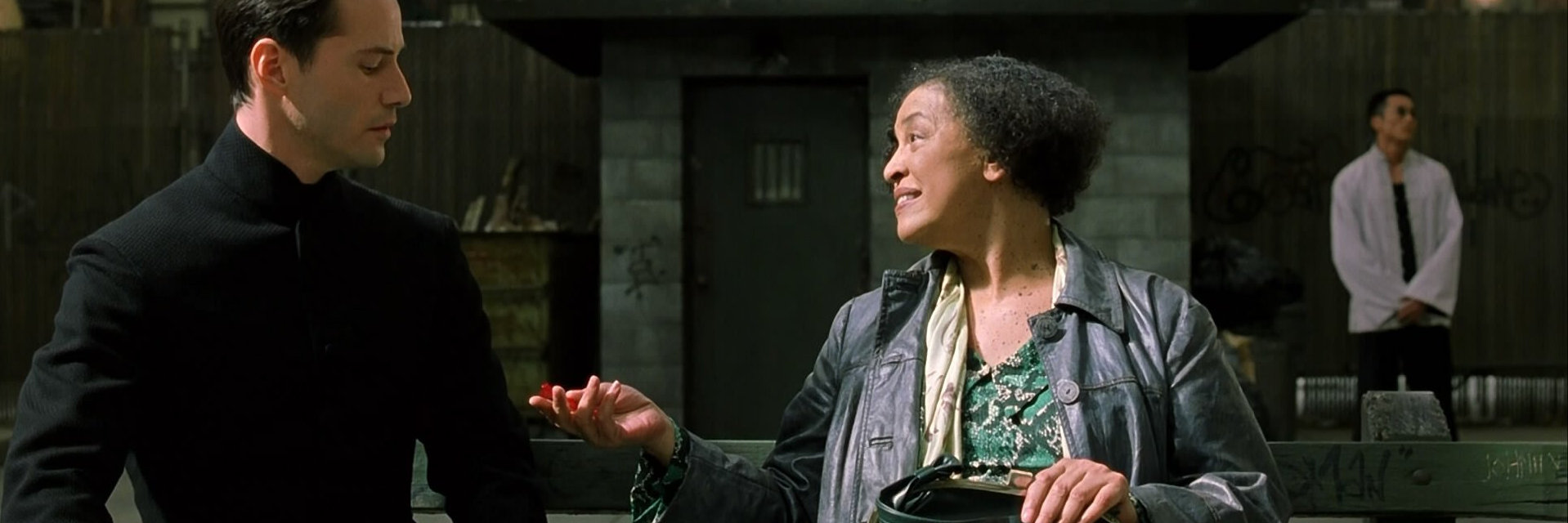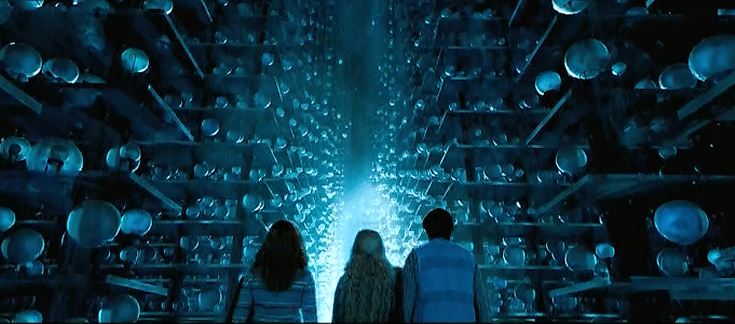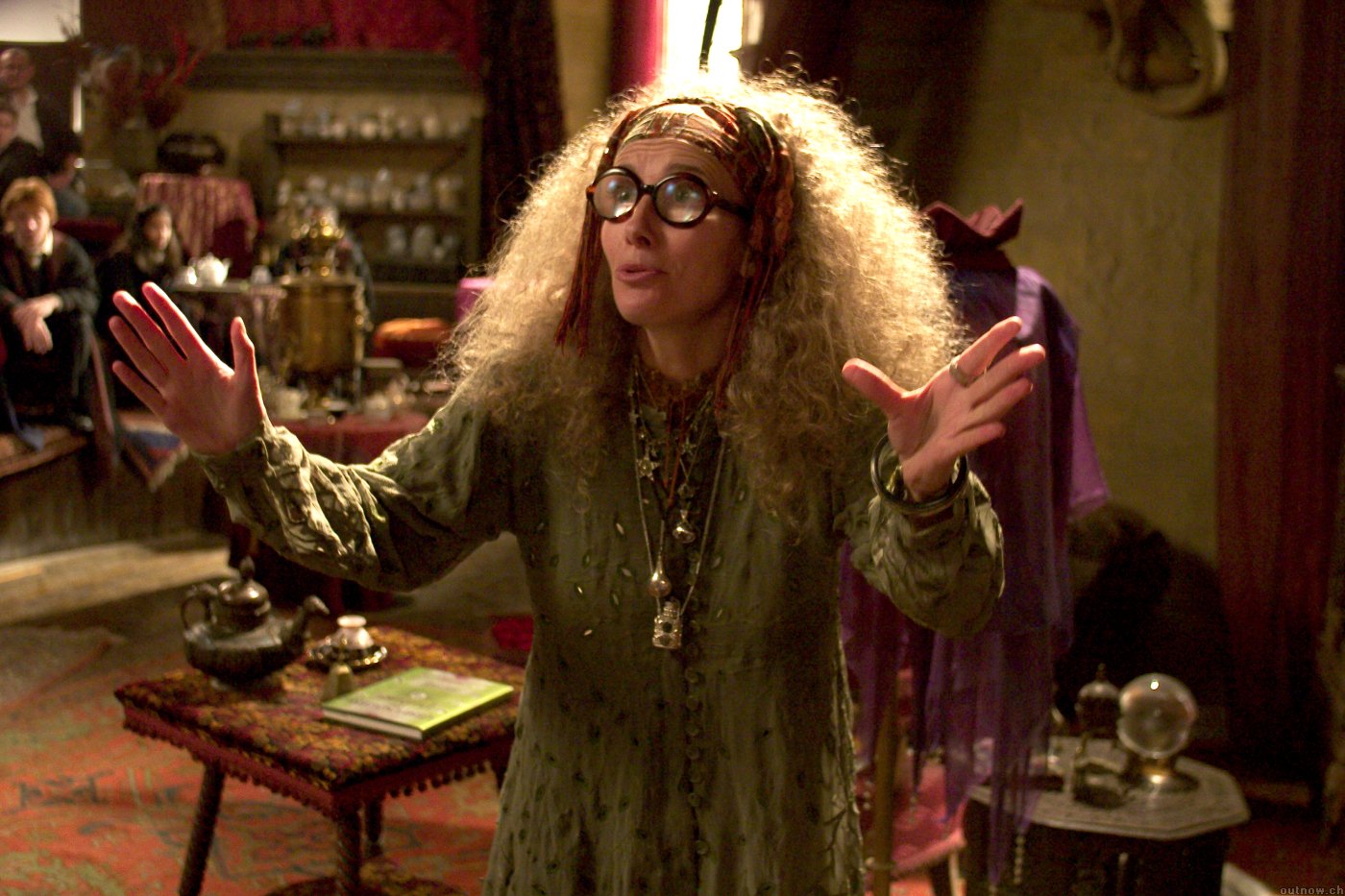
Introducing the 'F' Word (Part 1)
Oracle: Candy?
Neo: Do you already know if I’m going to take it?
Oracle: Wouldn’t be much of an Oracle if I didn’t.
Neo: But if you already know, how can I make a choice?
The Matrix Reloaded
If the oracle knows the future, then – we might think, as Neo seems to – that this means the future is somehow fixed or inevitable; it is fated, predestined, beyond our control. But we like to think of the future as open, as up to us. We feel quite differently about the past: it’s over and done with, and we can know what happened then without our knowledge confining the past, or bringing about the past. Knowing the future, however, is a different matter. The future waits for us to shape it, to mould it – we’re free to do something about it. And it is this freedom that the oracle’s knowledge (or that of God, a supercomputer, a fortune teller, a future-visiting time traveller etc.) seems to threaten. How can Neo make a choice, if the choice already has a knowable outcome?
Neo isn’t the only character in such a quandary: these worries echo throughout the centuries, with early ponderings by Cicero, Augustine, and Boethius, to name a few.[1] In this series we’ll be looking at how pervasive these worries are (in fiction and in life), what we might mean by ‘free’, and why contemporary philosophers think that foreknowledge doesn’t imperil our free will. The first step, which will be the focus of this first instalment, is to examine a philosophically important, but often overlooked, distinction:
We can differentiate between things that might happen, things that will happen, and things that must happen. For example, I might (indeed, probably will) enjoy the new season of Archer, the sun will come up tomorrow, and a triangle must have three sides. When the oracle tells the truth about the future (as we learned in The Matrix, sometimes she lies), she describes what will happen. But her utterance doesn’t bring the future about, it doesn’t cause the future to be a certain way (except, perhaps, in self-fulfilling cases, which we’ll get to later in this series). Generally speaking, when someone knows the future, that knowledge describes, but doesn’t dictate (or cause), future events.

Take the Hall of Prophecy in the Department of Mysteries. Some of the prophecies describe a future that might come to pass. Some of them are accurate, and describe the future as it will occur. Some will, once heard, influence the choices of those that hear them. But none set the future in stone, none make it the case that something must happen, no matter what. As Dumbledore tells Harry, “the prophecy does not mean you have to do anything!... you are free to choose your way, quite free to turn your back on the prophecy!”[2].
“You see, the prophecy does not mean you have to do anything! … In other words, you are free to choose your way, quite free to turn your back on the prophecy!”
To see why this is the case, consider non-magical, non-mysterious foreknowledge, i.e. the kind we ordinarily think we have. In the course of an average day you might claim to know that you’ll be having pizza for dinner (because you intend to), that your BFF will call (because they told you they would), or that it’ll get dark eventually (because it has every night so far). In technical terms, these are, respectively, instances of intentional, testimonial, and inductive knowledge. Unlike when the Oracle knows Neo’s future, these sorts of cases don’t tend to worry us. It seems clear that you knowing you will have pizza for dinner doesn’t mean you had to consume Italian, and likewise, your knowing it will get dark at the end of the day won’t cause it to do so, or prevent the sun staying in the sky all evening (if, for instance, you were in the right part of the world for it to do so). Similarly, your knowing your friend will call doesn’t mean their calling was inevitable. Of course, you might indeed have knowledge in these cases – you might be reporting something true about the future – but it could have been otherwise. The world could have been such that you were mistaken, even if, as actually turns out, you were correct.

Forgive me some more terminology: epistemology is the study of knowledge, and there is a lot of debate about what is required for someone to know something (Will a true belief suffice? What sort of justification or evidence is required? Does the way they acquired the knowledge matter?). Although different theories posit different answers to these questions (some of which we’ll explore in future articles), most accounts of ordinary knowledge are fallibilist.That is, it is sufficient that a person’s beliefs happen to be true (along with the other criteria the theory requires, such as appropriate justification), it needn’t be the case that they couldn’t have been false. That’s a lot of negatives.
Take Professor Trelawney. Very occasionally (twice), she makes a strikingly accurate prediction. Mostly, her foretellings are ambiguous, and, like horoscopes, can be seen to loosely fit the events after they have unfolded. Suppose Trelawney tells Dumbledore that he will trip over a teapot next Thursday. Does she know he will? Most theories of knowledge will require three things for this to be true: that Trelawney believes Dumbledore will trip over the teapot, that it is true he will trip over the teapot, and some third requirement which varies depending on the particular account (that she acquired the belief in an appropriately reliable way, that she has good reasons for her belief etc.). If we are being fallibilists about knowledge – as many epistemologists are – then so long as Trelawney has a true belief that Dumbledore will trip over the teapot, it doesn’t matter that on other occasions she’s been wrong, or that if things had turned out differently, she would have been wrong on this occasion. What matters is that, as things turned out, she had a belief and it was true.
So, if you believe you will eat pizza for dinner, and satisfy the other required criteria of a given theory of knowledge, and then come this evening you do eat pizza, I’d be inclined to say that you knew you would (and, given our usual speech practices, I’d hazard that you’d say so too). This, then, is a case of ordinary foreknowledge. This is true even though you could have been proven wrong (by, for instance, your local pizza joint being sold out of pepperoni, or the Teenage Mutant Ninja Turtles moving into the neighbourhood), because as things turned out, you weren’t.
The mystical, magical type of foreknowledge is just like this. While it is true that if the Oracle knows Neo will take a sweet, he will take a sweet, there is nothing necessary about it being true: it didn’t have to be.[3] Neo could have refused, and the Oracle would have known he would (or been wrong). It’s just like reading your old diary: if it is an accurate record of the past, i.e. if what it says is true, then the events it describes occurred. You really did pine over Idris Elba as Heimdall, miss the bus and have to walk to school, or write a play featuring your cat as a soviet lunch-lady. But the diary doesn’t have magical powers (Horcruxes aside); it merely reports the past, it doesn’t constrain it. Likewise, Trelawney’s predictions don’t dictate the future, they just report the way it happens to turn out. It could have turned out differently, in which case Trelawney would have been mistaken, or would have made a different prediction. (This isn’t a new idea – you might have heard it in a different form in response to worries about God’s foreknowledge: you don’t have to do what God knows you will, but rather whatever you decide to do, God will know.)
The punchline: someone knowing the future doesn’t fix the future; it doesn’t make it inevitable or fated. There’s a difference between some that will come to pass, and something that has to.

But understanding the distinction is only the first part of this puzzle. Questions remain, including:
- But surely ordinary knowledge of the future is different to the kind of knowledge the Oracle or Trelawney has. They can see the future. And what about a time traveller who can literally walk around in that future?! Doesn’t that make a difference?
- What about self-fulfilling prophecies? Sometimes it’s knowing what you will do that makes you do it! Isn’t that weird?
- Even if some predictions or prophecies turn out to be false, don’t the true ones undermine our free will? Sure, we might have acted differently, but obviously we didn’t, or it wouldn’t be foreknowledge!
In short: nope, totes weird (but not problematic), and usually no (but there may be exceptions). We’ll get to the why in future instalments.
For now, if this has piqued your interests, see the further reading below. If something’s unclear, or you have fictional examples to suggest or that you’d like explained, let us know in the comments.
Footnotes
[1] See for instance, Augustine, City of God, Book V Chapter 9 §2, and Boethius, The Consolation of Philosophy, Book V Chapter 3.
[2] J. K. Rowling, Harry Potter and the Half-Blood Prince, pp. 478-479.
[3] The logic goes as follows: necessarily if I know that you will do A, then you will do A. I know that you will do A, thus you will do A. However, it is fallacious to move from the necessity of the conditional (the if...then statement) to the necessity of the consequent (the bit after the 'then', in this case, 'you will do A'). Why? Because there's nothing necessary about my knowing that you will do A. I could have known you would do B instead, or mistakenly believed you would do A. For more on this, see Clark 2007 p. 52f. If you'd like further explanation (or to see it in symbols), let me know in the comments.
References
- Augustine, City of God, trans. Henry Bettenson, G.R. Evans (ed.), London: Penguin Classics, 2006.
- Boethius, The Consolation of Philosophy, trans. D. R. Slavitt, Cambridge, MA: Harvard University Press, 2008. (This sticks fairly close to the original Latin, but there's also a very readable translation by P. G. Walsh, OUP).
- Clark, M., Paradoxes from A to Z, Second Edition, London: Routledge, 2007.
Further Reading
For more fictional instances of this trope, and some aversions, see:
- TV Tropes, "Prophecies Are Always Right", http://tvtropes.org/pmwiki/pmwiki.php/Main/PropheciesAreAlwaysRight.
- TV Tropes, "Immune to Fate", http://tvtropes.org/pmwiki/pmwiki.php/Main/ImmuneToFate.
No comments
Start the conversation…